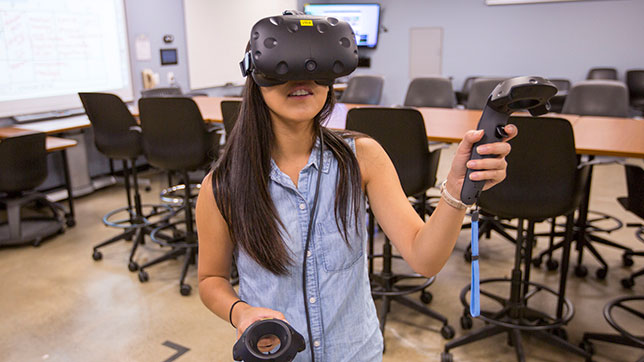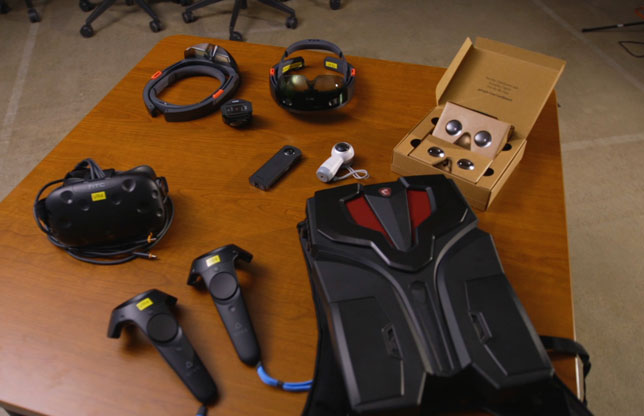Supporting Teaching and Research with Immersive Tools
San Diego State University has created a center for teaching with virtual-, augmented- and mixed-reality tools that supports research in the cross-curriculum implementation of immersive pedagogies.
Category: Education Futurists
Institution: San Diego State University
Project: ViTaL (Virtual Immersive Teaching and Learning)
Project lead: James Frazee, senior academic technology officer and director, instructional technology services
Tech lineup: Apple, Asus, Google, HTC Vive, Lenovo, Magic Leap, Meta View (formerly Meta), Microsoft, MSI, Nikon, Oculus, Ricoh Theta, Samsung

San Diego State University student using virtual reality headset
Since its launch in the fall of 2017, San Diego State University's VITaL initiative has provided faculty with extensive tools for immersive learning, virtual reality, augmented reality, mixed reality and simulation. SDSU faculty are supported with access to the latest tools and more general applications from tech giants like Apple, Google, Microsoft, HTC Vive, Nikon, Lenovo, Asus and Samsung, along with more specifically targeted offerings in immersive technology, for example, Magic Leap, Meta View, MSI, Oculus and Ricoh Theta.
VITaL resources have been widely incorporated into SDSU's curriculum, from 100-level undergraduate classes to 700-level doctoral research seminars, representing all colleges at the university.

VITaL provides access to extensive tools for immersive learning, virtual reality, augmented reality, mixed reality and simulation.
But VITaL includes far more than access to higher-end technology. Research programs, conducted both within SDSU and with other academic institutions and industry partners, explore immersive pedagogies and technology applications, ranging from the study of holographic simulations in nursing education, to an examination of simulation tools and the Microsoft HoloLens for teaching the phases of the moon to introductory astronomy students, to the foundation of student organizations such as the Aztec Game Lab and SDSU Virtual Reality Club.
Dissemination of research done through the VITaL framework has spawned further interdisciplinary collaborations along with professional conferences and workshop vehicles for faculty development, including a system-wide CSU Immersive Learning Summit.
Besides the development and integration of immersive programs for teaching and learning, VITaL features intensive examinations of immersive pedagogies, as well as practical considerations for program implementation. Concepts of active learning and student mastery, the transformation of students from novice to expert, and student understanding of content through problem-based learning are just a few of the research focus topics. Research demonstrating how innovation in immersive learning and simulation impacts student outcomes is highly relevant to both higher education strategies and industry trends.

James Frazee
Project lead James Frazee, SDSU's senior academic technology officer and director of instructional technology services for the university, reflected on the continued relevance of VITaL: "In response to COVID-19, the move to remote instruction for all of SDSU (and all levels of education around the world) provides a unique opportunity to further explore the use of XR to provide engaging distance learning — particularly for hands-on activities, such as labs."
Frazee also summarized just a few of the more recent research initiatives in VITaL's agenda. "We received three mini-grants in partnership with faculty (astronomy, mechanical engineering, and biology), and just submitted a large $1,000,000 grant proposal to the USDA to expand the VITaL initiative to SDSU Imperial Valley, located 100 miles east of our main campus," he noted. "Additionally, we submitted a 'Big Ideas' proposal to develop empathy-building training for inclusive hiring practices here at SDSU."
SDSU has measured the interest and demand for immersive technologies in education through several outreach events and data collection instruments. At SDSU, demand for the VITaL Learning Research Studio (LRS) far exceeds capacity. Additionally, data from LRS post-occupancy surveys show that students and faculty are enthusiastic about using this new technology. In response, the California State University Chancellor's Office is leveraging SDSU's VITaL initiative to build an AR/VR/AI community with a focus on student success.
"The enthusiasm from across SDSU — students (current and future), faculty, staff and administration — around our VITaL initiative has resulted in an increased motivation to learn, teach and provide support across campus," stated Frazee.
This VITaL project has earned high praise among education professionals for its explorations of deeper learning and higher-order thinking. It was selected for recognition in the 2019 Educause Horizon project, among others. VITaL has the unique quality of being informed by a solid foundation of pedagogical research while opening up to imaginative applications and innovation.
Return to Campus Technology Impact Awards Home